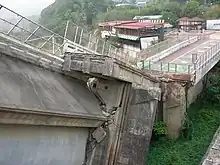Shigang Dam
| Shihgang Dam | |
|---|---|
 | |
| Official name | 石岡壩 |
| Location | Shigang District / Dongshi District of Taichung, Taiwan |
| Purpose | flood control, water storage, regulation, recreation |
| Status | In use |
| Construction began | 1974 |
| Opening date | 1977 |
| Operator(s) | Ministry of Economic Affairs |
| Dam and spillways | |
| Type of dam | Gravity Dam |
| Impounds | Dajia River |
| Height | 25 m (82 ft) |
| Length | 352 m (1,155 ft) |
| Dam volume | 141,300 m3 (4,990,000 cu ft) |
| Spillway type | 15 controlled drum-gate |
| Spillway capacity | 13,000 m3/s (460,000 cu ft/s) |
| Reservoir | |
| Total capacity | 3,380,000 m3 (119,000,000 cu ft) |
| Active capacity | 1,430,000 m3 (50,000,000 cu ft) |
| Catchment area | 1,061 km2 (410 sq mi) |
| Surface area | 0.645 km2 (0.249 sq mi) |
| Normal elevation | 267 ft (81 m) |
| Website Central Region Water Resources Office, Water Resources Agency, Ministry of Economic Affairs – SHIGANG DAM | |
Shihgang Dam (traditional Chinese: 石岡壩; simplified Chinese: 石冈坝; pinyin: Shígāng Bà) is a concrete gravity barrage dam across the Dajia River in Shigang District and Dongshi District of Taichung, Taiwan, located near Fengyuan District.[1] The dam was built from 1974 to 1977 for flood control and irrigation purposes, and stands 35.2 m (115 ft) high and 357 m (1,171 ft) long, holding a reservoir with an original capacity of 3,380,000 m3 (2,740 acre⋅ft).[2]
The dam was heavily damaged in the 921 earthquake of 1999, which caused the collapse of its northern end. Subsequently, an embankment cofferdam was built to prevent water from flowing through the breach, while the collapsed section has been retained as a memorial. Since this reduces the storage capacity of the dam, it is no longer used for flood control, but remains an important source of agricultural water.

References
- Keh-Chia, Y. (2018). Scour and Erosion IX: Proceedings of the 9th International Conference on Scour and Erosion (ICSE 2018), November 5-8, 2018, Taipei, Taiwan. CRC Press. p. 354. ISBN 978-0-429-66507-3. Retrieved 17 April 2019.
- Reservoirs and Weirs in Taiwan (in Chinese). Taiwan Water Resources Agency, Ministry of Public Affairs. p. 328.